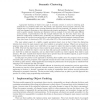Free Online Productivity Tools
i2Speak
i2Symbol
i2OCR
iTex2Img
iWeb2Print
iWeb2Shot
i2Type
iPdf2Split
iPdf2Merge
i2Bopomofo
i2Arabic
i2Style
i2Image
i2PDF
iLatex2Rtf
Sci2ools
103
click to vote
POS
1990
Springer
1990
Springer
Semantic Clustering
Appropriate clustering of objects into pages in secondary memory is crucial to achieving good performance in a persistent object store. We present a new approach, termed semantic clustering, that exploits more of a program's data accessing semantics than previous proposals. We insulate the source code from changes in clustering, so that clustering only impacts performance. The linguistic constructs used to specify semantic clustering are illustrated with an example of two tools with quite different access patterns. Experimentation with this example indicates that, for the tools, object sizes, and hardware configuration considered here, performing any clustering at all yields an order of magnitude improvement in overall tool execution time over pure page faulting, and that semantic clustering is faster than other forms of clustering by 20%
Related Content
| Added | 11 Aug 2010 |
| Updated | 11 Aug 2010 |
| Type | Conference |
| Year | 1990 |
| Where | POS |
| Authors | Karen Shannon, Richard T. Snodgrass |
Comments (0)

